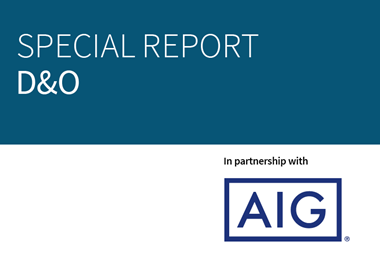The UK is likely to see a high level of insolvencies, losses, and projects put on hold

Uncertainty and financial planning are never easy companions. But Brexit means all firms need to find ways to help them coexist.
While it now seems that much of the doom-laden prereferendum rhetoric was an exaggeration and we are unlikely to see the kind of financial meltdown we saw in 2008 – with the associated international credit crunch – there are still real risks to trade credit.
“We are looking at a protracted period of uncertainty and volatility,” says Neil Ross, AIG regional manager EMEA for trade credit.
“We are likely to see a high level of insolvencies, of projects put on hold – and of losses. All of this will affect trade credit and firms need to manage this risk more proactively.”
For example, it is possible that credit vulnerability and credit claims in the UK could increase markedly, “particularly in relation to the construction sphere”, says Nick Williams, head of Kennedys Law insurance division.
“It seems reasonable to anticipate that many projects will be put on hold and a snowball effect could easily occur.”
In those areas that attract international players the considerable fall in Sterling may well add to a counter-balancing flood of money from abroad, but in most of the UK that may not be significant.
Some might argue that, traditionally, credit risk management is the responsibility of the corporate treasurer in a large company. But in a Brexit scenario it’s clear that the risk manager needs to be intimately involved in navigating their employer through these difficult times, especially because of the importance of insurance in securing a successful outcome.
“[Risk managers] must support the assessment of credit risk and should also ensure that directors’ and officers’ (D&O) underwriters are kept informed of changed circumstances,” says Mark Simpson, head of consultancy at Armour Risk Management.
“The risk manager needs to understand the issues and support consideration of risk factors when the company seeks to gain access to additional capital.”
Finding new markets
While the knock-on effect of the UK leaving the EU is impossible for businesses to quantify with meaningful accuracy, it is likely that small and medium-sized businesses – those that do not have the scale to shift their trading patterns or adapt to new market conditions easily – will be among those hardest hit, says Ross.
“The likely consequences of Brexit will be the need to find new sources of business or to step up trade in less familiar markets,” he says.
“If firms are going to become more export- focused they will need to position themselves more effectively. And they are going to have to think seriously about how they manage their credit risk.”
One way to do this is with trade credit insurance (TCI), which offers companies a degree of certainty over their cash-flow. TCI provides protection for companies that sell goods or services on credit terms and are exposed to the risk of non-payment as a result of a domestic or export customer’s insolvency, protracted default or political risks that may prevent the buyers from fulfilling their payment obligations.
Management tool
“Managers responsible for buying insurance know about property and casualty risks, but often don’t know about the moveable feast that is trading risk,” says Ross.
“Or that TCI is not just a commodity but a highly effective management tool to help companies avoid taking on other companies’ risks, and thus minimise bad debt.”
In recent years, TCI has become widely seen as a discretionary purchase. Market penetration is relatively low – around 20% in the UK. This is partly because, in the fallout from the 2008 banking crisis, trade credit products were accused of being “fair weather friends”, with some providers arbitrarily pulling cover just as it was needed most.
“But the market has moved on significantly since then,” says Ross. “Innovation has been led by greater proliferation of excess of loss, non-cancellable cover, which stops credit insurers from reining back or withdrawing their credit limits.”
Brexit is making this type of cover more essential than ever, both as a protector and a business tool providing a competitive edge. For example, those firms that export heavily into the EU could in future face a situation where that trade is governed by separate legal regimes and limited by trade agreement.
Faced with possible changes in access to EU markets, many firms are looking to export further afield. But this will mean tolerating longer payment terms. Not only to allow for longer shipping times, but also to stay competitive.
“If you look at every sector, every year payment terms have increased by 2.5-3%,” says Ross. “If you go back 10 years, 45 days was standard.
“Now it’s 90 or even 150. Being able to offer long terms has become a marketing tool, and that has to be financed. Working capital will have to increase.”
But, while many traditional banks were happy financing trade into the EU, they may be much less happy about markets in Africa or Asia – unless trade credit cover is in place.
In these circumstances, the right insurance could be the difference between getting a bank’s support in a time of change, and being left adrift.
The expectation is that Brexit will take time to work through.
Protecting working capital and receivable assets is essential in this environment: firstly to ensure that a company remains competitive and profitable, but secondly to protect the board from the kind of D&O claim that could deliver the coup de grace to a firm trying to adapt fast to Brexit.
D&O/Trade Credit insured v insured
A significant problem for directors and officers of firms without trade credit insurance (TCI) could be that their D&O policy limits are spent defending claims arising from the firm’s failure to purchase TCI, meaning that there could be nothing left for the benefit of the director in the event of a “real” claim, according to Noona Barlow, head of liabilities and financial lines claims, Europe at AIG.
“We have seen several similar claims against directors as a result of a company’s failure to have any trade credit insurance,” she says.
“The facts in each claim scenario are very similar. Usually, the policyholder sues one or more directors as a result of losses arising from non-payment by customers, frequently as a result of the insolvency of the customer.
“In each case the allegations suggest that the director or directors granted credit or increased credit limits without internal authority and/or that they failed to obtain adequate security from the customer.”
Protecting key staff
One of the main risks associated with Brexit is the potential for changes to the residency status of key expat staff that may affect their ability to work– and having the right insurance is critical to addressing this uncertainty.
To meet this need AIG recently launched an addition to its D&O policies that will cover legal challenges in the event of permanent residency applications being rejected pre Brexit, and the subsequent challenges to repatriation orders post-Brexit.
Separately, the new addition will also cover legal costs for executives living in the UK and EU to fight a repatriation order as a result of termination of the UK’s EU membership.
Should the legal challenge to the repatriation order be unsuccessful, the addition will also cover reasonable relocation costs of repatriation.




















No comments yet